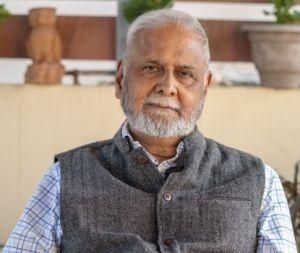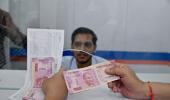'Isn't it obvious? Do you have a doubt? There is so much data that shows that there is quid pro quo.'
'There are many instances of donations being given after the raids, donations being given before the award of a contract and many other permutations and combinations.'

The Association of Democratic Reforms was one of the four petitioners to challenge the electoral bonds scheme in the Supreme Court.
ADR has doggedly pursued the case as lead petitioner since moving the Supreme Court in 2017. On February 15, 2024, the Supreme Court annulled the electoral bond scheme in an unanimous verdict.
Professor Jagdeep Chhokar is one of the founders of the ADR that was established in 1999 by a group of professors from the Indian Institute of Management- Ahmedabad.
ADR's mission is to increase transparency, accountability and bring about political-electoral reform in the country.
It is because of the PIL filed by ADR in 1999 that it is mandatory for all candidates contesting elections to disclose criminal, financial and educational background prior to the polls by filing an affidavit with the Election Commission.
In an interview with Rediff.com's Archana Masih, Professor Chhokar speaks about what surprised him about the electoral bond disclosures and how poll funding can be cleaned up.
What surprised you most of the electoral bonds disclosures?
After the judgment, everybody thought that the State Bank of India would release the information, but the SBI's application on March 4 was the biggest surprise.
First they said on affidavit that the disclosure of data would take three-and-a-half months. Then the advocate for SBI said they would give the data, but it would take three weeks.
Both these statements were not true and subsequently what was supposed to come out in three-and-a-half months came out in four days.
SBI has not come out in very good light which is a big surprise because it has an impeccable reputation.
What are some of the other unexpected revelations from the disclosures?
From the statements given by the political parties to the Election Commission, it is not a surprise that the BJP has got about 50% of the donations, but one did not expect unknown entities like the lottery company [Future Gaming] and Megha Engineering to be the top donors.
I had never heard of these and it came as a big surprise to me.
Secondly, the fact that companies being raided by the enforcement agencies were donating while being raided was also a surprise.
So, there were plenty of surprises, not all were unexpected. This has actually confirmed without a doubt of the existence of a corporate-political nexus.
Everybody knew there was a nexus and spoke about it, but this has provided concrete proof.
It is not going to be easy for anyone to say that this nexus does not exist. It does.
Considering the SBI is a respected Indian institution, do you feel it is liable and should be hauled up for this?
The SBI being liable has nothing to do with it being a large and respectable institution. Any entity which makes an incorrect statement in court is liable, and if the statement is made on affidavit, it is even worse.
In my limited understanding, liability exists. Whether the Supreme Court decides to enforce this liability or somebody goes to court to get this liability enforced is a separate issue, but the fact to me appears that they did make a wrong statement in court on affidavit which is a serious matter regardless of the reputation.
There is a law in the Indian Penal Code about lying under oath. The seriousness of the matter increases because it is a large and respected institution.
Do you believe there was a quid pro quo? Is ADR demanding a Special Investigation Team to investigate the quid pro quo?
ADR is not demanding anything. I will clarify that, but I don't have to say that there is a quid pro quo. Isn't it obvious? Do you have a doubt? There is so much data that shows that there is quid pro quo.
There are many instances of donations being given after the raids, donations being given before the award of a contract and many other permutations and combinations.
You see, quid pro quo is not only in one form.
Do you believe these allegations will be thoroughly investigated to follow the truth about quid pro quo?
I certainly hope so.
How do you view the absence of major corporates among the companies that brought the bonds?
We don't see their names because they didn't buy the bonds.

A lay person would ask if such corporates fund political parties in some other way.
That is for anybody to guess. The question to ask is whether they fund or do not fund political parties. Some people will say that they don't, while some will say it is very difficult to believe that big corporates don't give donations to political parties.
If we follow the second belief that it is very difficult to believe that corporates don't fund political parties, then it proves that electoral bonds was not the only method of paying political parties.
The other method was electoral trusts. The Tatas have an electoral trust, but other large companies don't.
So does that mean these other large companies do not donate to political parties? And if they do, how do they do it -- that is the mystery.
I would submit that one possible explanation is that unaccounted money was being given to political parties even when the electoral bond scheme was in force.
This shows that the electoral bond scheme did not do much to prevent other sources of funding towards political parties.
This is an inference, not a definite conclusion.
Do you think the government -- if the BJP wins the third term -- will resurrect the electoral bond scheme in a different avatar?
That remains to be seen. I don't have any view on this. I did not even imagine that the government will come out with the electoral bond scheme, so I cannot imagine what the government will do.
The Supreme Court has laid down two principles for free and fair elections which is a necessary requirement for democracy:
1. A level playing field -- all political parties that take part in an election should have equal access to resources of all kinds, not only money.
2. Voters have a right to know from where political parties get their money.
So even if the government comes up with another scheme, it will have to satisfy these two criteria.
 IMAGE: Professor Jagdeep Chhokar
IMAGE: Professor Jagdeep ChhokarWhat would ADR's solution be to contest elections without dirty money?
ADR has two solutions.
1. Political parties should be demonstrably internally democratic.
We have to think why contesting elections is so expensive. It is expensive because the candidates who contest elections are chosen randomly by the leadership of political parties. The members of the party on the ground have no say in who should be the candidate. This shows that parties do not function democratically in their internal affairs.
In a country which proudly says that we are a vibrant democracy, it is institutions like political parties that uphold democracy. A country cannot be a democracy unless the pillars supporting democracy are democratic.
The Law Commission of India said this in its 170th report in 1999.
The reason why elections cost so much of money is because of a series of events like the non democratic functioning of parties.
Holding an election for party president is not enough; parties have to be democratic till the grassroot level.
It should be demonstrable, not notional.
2. The income and expenditure of political parties should be done digitally. We are the world leaders in UPI [Unified Payment Interface]. If political parties receive money through digital transactions, then the Supreme Court directive that citizens have the right to know how political parties are funded will be fulfilled.
Also, the explanation that the donor's identity is kept secret so that a political party does not victimise the donor of another party is a convoluted one.
Political parties have to come to an agreement that they are not vindictive to each other's donors. This is a problem created by political parties and society cannot solve it. The onus is on political parties -- they have to behave responsibly.
Unfortunately, since they are unlikely to behave responsibly, the country needs a law to regulate the functioning of political parties which will see that they are demonstrably democratic and financially transparent. But who will make the law is the big question.
If political parties continue irresponsibly, then the Judiciary will have to act like what it has done now. The Executive, Legislature and Judiciary are the three pillars of democracy and if one does not act properly, the Judiciary will have to step in which politicians don't like.
- Part 2 of the Interview: 'Democracy is not a destination'
Feature Presentation: Aslam Hunani/Rediff.com











 © 2025
© 2025